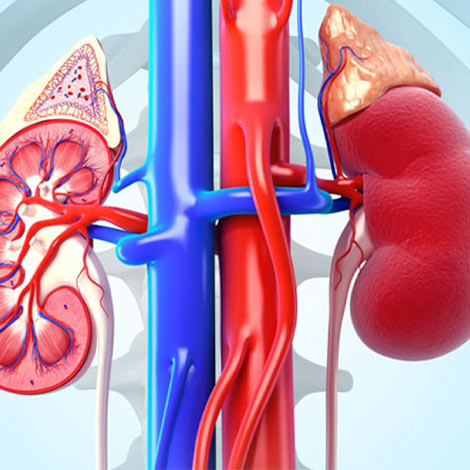Best Kidney Inflammation Treatment in Vijayawada
What is Glomerulonephritis?
Glomerulonephritis is a group of kidney diseases that involve inflammation of the glomeruli — the tiny filters within the kidneys responsible for removing waste, excess fluids, and electrolytes from the bloodstream. This condition can be either acute (sudden onset) or chronic (progressive over time), and if left untreated, it can lead to kidney failure.
At Veda Hospital & Kidney Centre, we specialize in diagnosing and treating kidney-related conditions like glomerulonephritis. Under the expert care of Dr. M.V. Viswanath, a trusted Glomerulonephritis Treatment Doctor in Vijayawada, patients receive evidence-based treatment and individualized care plans.

Types of Glomerulonephritis
- Acute Glomerulonephritis: Often triggered by infections like strep throat or impetigo. Symptoms appear suddenly and may resolve on their own or require treatment.
- Chronic Glomerulonephritis: A progressive disease that develops slowly and may result in irreversible kidney damage.
- Primary Glomerulonephritis: When the condition originates in the kidneys without other systemic diseases.
- Secondary Glomerulonephritis: Caused by underlying health issues like lupus, diabetes, or infections such as hepatitis B or C.
Causes of Glomerulonephritis
The causes of glomerulonephritis vary depending on the type. Some common causes include:
- Post-streptococcal infections
- Autoimmune diseases like lupus
- Viral infections (e.g., hepatitis B and C, HIV)
- Diabetic nephropathy
- Vasculitis (inflammation of blood vessels)
- IgA nephropathy (Berger’s disease)
- Genetic conditions such as Alport syndrome
Symptoms of Glomerulonephritis
Symptoms may vary based on the severity and type but commonly include:
- Blood in urine (hematuria) — urine may appear pink or brown
- Foamy urine due to excess protein (proteinuria)
- Swelling in face, hands, feet, and abdomen
- High blood pressure
- Fatigue and weakness
- Decreased urination
- Shortness of breath (in severe cases)
Diagnosis of Glomerulonephritis
To diagnose glomerulonephritis, the following tests may be conducted:
- Urine tests: Detect blood, protein, or other abnormalities.
- Blood tests: Measure creatinine, BUN, and glomerular filtration rate (GFR).
- Imaging tests: Ultrasound or CT scan to examine kidney size and structure.
- Kidney biopsy: A small tissue sample is taken to determine the exact type and severity of glomerulonephritis.
Treatment for Glomerulonephritis
Treatment depends on the cause, type, and stage of the disease. At Veda Hospital & Kidney Centre, a leading Glomerulonephritis Hospital in Vijayawada, we offer tailored treatment options, including:
- Medications: Steroids, immunosuppressants, ACE inhibitors, ARBs, and diuretics.
- Blood pressure control: Essential to slow down disease progression.
- Plasma exchange (plasmapheresis): Used in severe or autoimmune-related cases.
- Dialysis: In cases of kidney failure or severe fluid overload.
- Lifestyle changes: Low-sodium, low-protein diet and fluid restriction under medical supervision.
Dr. M.V. Viswanath, recognized as a top Glomerulonephritis Treatment Doctor in Vijayawada, provides a multidisciplinary approach with nephrologists, dieticians, and critical care specialists for optimal outcomes.
Complications of Untreated Glomerulonephritis
- Chronic kidney disease (CKD)
- Acute kidney injury (AKI)
- High blood pressure
- Heart failure due to fluid overload
- Nephrotic syndrome
- End-stage renal disease requiring dialysis or transplant
Prevention Tips
- Treat infections promptly, especially throat and skin infections
- Manage chronic conditions like diabetes and hypertension
- Avoid overuse of NSAIDs and other kidney-damaging medications
- Regular health checkups, especially for those with family history of kidney disease
- Practice good hygiene to reduce the risk of infections
Why Choose Veda Hospital & Kidney Centre for Glomerulonephritis Treatment?
- Expert nephrology care led by Dr. M.V. Viswanath
- Comprehensive diagnosis with modern lab & imaging facilities
- Tailored treatment for acute and chronic glomerulonephritis
- Advanced dialysis unit for critical renal care
- Patient-centered approach and affordable care
Frequently Asked Questions (FAQs)
Is glomerulonephritis curable?
Acute forms may be cured with timely treatment, but chronic glomerulonephritis may require long-term management.
How is glomerulonephritis different from other kidney diseases?
It specifically involves inflammation of the glomeruli, unlike other diseases that may affect the entire kidney or urinary tract.
Can glomerulonephritis cause permanent damage?
Yes, if untreated, it can lead to chronic kidney disease and kidney failure.
What are the early warning signs?
Blood in urine, swelling in the face or legs, and frothy urine are common early symptoms.
Is hospitalization necessary for glomerulonephritis?
It depends on the severity. Mild cases may be managed on an outpatient basis; severe cases may require hospital care.
What diet should a patient with glomerulonephritis follow?
A kidney-friendly diet with low sodium, moderate protein, and limited potassium and phosphorus is usually recommended.
Is dialysis always needed?
Not always. Dialysis is only required in advanced cases or when kidneys lose significant function.
Can children develop glomerulonephritis?
Yes, it can occur in children, often post-infection. Pediatric nephrology care is essential in such cases.
Who is the best doctor for glomerulonephritis in Vijayawada?
Dr. M.V. Viswanath at Veda Hospital & Kidney Centre is one of the most trusted names for glomerulonephritis treatment in Vijayawada.
Glomerulonephritis is a serious kidney condition that requires prompt diagnosis and professional management. Early treatment can help prevent complications and preserve kidney function. If you or a loved one is experiencing symptoms of glomerulonephritis, consult Dr. M.V. Viswanath at Veda Hospital & Kidney Centre, a leading Glomerulonephritis Hospital in Vijayawada, for expert care and advanced treatment.
Best healthcare providers

Unmatched Nursing Support

Top-notch Patient Care

Hospitable environment

Phenomenal intervention

